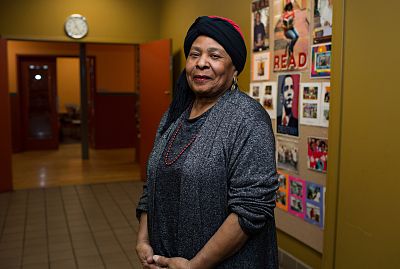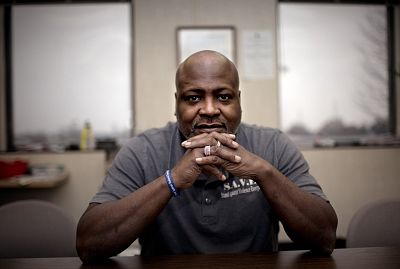Black leaders in the 2020 presidential candidate's hometown are frustrated as their mayor heads out the door.
SOUTH BEND, Ind. — As Pete Buttigieg prepares to leave office after two terms as mayor here at the end of the year, one important job remains undone — improving life for the African American community.
And the troublesome issue of race relations in this Rust Belt city of 100,000 won't fade for Buttigieg once his tenure at City Hall ends; indeed, it will only become more prominent now that he has solidified his standing among the top Democratic presidential contenders, even becoming a target of attacks from his rivals in last week's debate.
That lingering — and sometimes raw — unhappiness and frustration in South Bend, where blacks make up about a quarter of the population, with 40 percent living in poverty, threaten to upend candidate Buttigieg's efforts to court African Americans in early-voting states such as South Carolina, where he faces enormous hurdles in winning their crucial support.
In interviews last week with NBC News, black leaders in South Bend expressed anger on multiple fronts about their outgoing mayor — that he didn't do enough in his eight years in office to help the community, that one of his signature initiatives fell woefully short and that he never attempted locally what he's now proposing on the campaign trail nationally.
Aftera roaring start to his bid for the White House in April, Buttigieg's campaign was quickly forced to confront race-fueled problems in his hometown: a decision to demote the city's first black police chief; his handling of a scandal regarding that chief's having secretly recorded phone calls of some of his officers; and a contentious plan to knock down abandoned homes that were concentrated in poor, minority neighborhoods.
Then, in June, a white city police officer killed a resident whom police said was armed with a knife. The shooting exposed significant underlying racial tensions and forced Buttigieg to discuss his failures handling them during the first Democratic presidential debate.
"The Douglass plan"
Racial tensions in the city returned to the headlines again this month when a pro-Buttigieg rally held by African Americans who backed him was disruptedby a protester in a Black Lives Matter shirt.
Several of Buttigieg's critics in South Bend told NBC News the latest uproar was a product of growing frustration with the candidate's release this year of his "Douglass Plan," a comprehensive 2020 campaign proposal, named for abolitionist Frederick Douglass, to combat institutional racism.
One key tenet was to wipe out broad racial disparities nationally in incarceration for nonviolent drug offenses byeliminating prison time for all drug possession crimes, and by legalizing marijuana across the country.
Critics, however, point out that Buttigieg never addressed those issues locally when he had the chance as mayor.
"He hasn't pushed this at all here. We've never had this discussion," said Oliver Davis, a black member of the South Bend Common Council.
"If that's going to be a part of your Douglass Plan, I think we really need to ask, what are the efforts you have made here to tackle these same issues?" asked Davis, who has endorsed Joe Biden for president. "It's the definition of pandering."
Added Jorden Giger, an organizer with the city's Black Lives Matter chapter who was present at the skirmish, "It's more than a little hypocritical."
Buttigieg, in an interview with NBC News, acknowledged the criticism, but argued that his hands were tied on measures affecting drug policy. He said his administration had to be "mindful of the fact that when something is decriminalized is a matter of federal law and a matter of state law."
Diversity delayed
Another issue that has clawed at Buttigieg is his inability over eight years to diversify his city's police department. And he has faced criticism for not doing enough to foster solid relations between the city's predominantly white police force and its large, and disproportionately impoverished, African American community.
At the first Democratic debate in June, Buttigieg was asked why diversity in the police department hadn't improved during his tenure. "Because I couldn't get it done," Buttigieg admitted.
"He should have tried harder," said Gladys Muhammad, a supporter of the mayor and community activist who helps run South Bend Heritage, a neighborhood revitalization group.
Isaac Hunt, another Buttigieg backer who works with the mayor's Group Violence Intervention program, said, "They didn't do anything that would make a difference."
"They never went and talked to black people to see, like, 'What would it take for you to become a police officer?'" added Hunt.
As of December, 6.6 percent of the city's police department (15 officers in a force of 228 sworn officers) were African American, the department told NBC News. Critics note that's about half the level from 2012 — the year Buttigieg took office — when approximately 11 percent of the department's members were black.
Hunt acknowledged that it's not easy to recruit black officers in a city where racial tensions run high, but he said Buttigieg should have done more. "He should have been going around town recruiting, personally," Hunt said.
Spokespersons for South Bend and for the Buttigieg campaign pointed to a handful of modest initiatives undertaken by the Buttigieg administration to increase diversity within the department's ranks, including having purchased Facebook ads and the launching of "Project Homegrown," an initiative that aims to keep high school students interested in a police career engaged with the city until they are 21 (when they can be hired).
Buttigieg again admitted his ineffectiveness on the issue.
"What we can't argue with is that the department is not as diverse as it should be," he said. "A simple fact, and one that I've owned up to publicly."
Big plan, small results
The Group Violence Intervention (GVI) program is one initiative of the Buttigieg administration that the mayor and many of his black supporters point to as evidence that he's brought innovation to issues important to the African American community.
GVI is a model designed at the National Network for Safe Communities at John Jay College in New York for how cities can curb gang-related gun violence.
Using data, city law enforcement officials compiled a list of residents they feel are most likely to commit (or re-commit) gun violence. Then, several times a year, they invite them to closed-door sessions with police and prosecutors from all levels of government, representatives from social service agencies, pastors and other religious leaders, mothers of gun violence victims and past offenders who have turned their lives around.
Buttigieg brought the program to South Bend in 2014, earning plaudits for using a new and innovative approach to help curb gun violence — a problem largely affecting the city's African American community — and improve relations between the city's police force and the community.
The results have been mixed, at best.
Shootings in South Bend have fluctuated wildly since the program was introduced, according to data provided by Hunt, one of the supervisors for the program, and city officials.
Shootings are up since 2014 (there were 66 shootings in 2014, 85 in 2015, 81 in 2016, 102 in 2017 and 78 in 2018). "Group member involved," which can often mean gangs, shootings are up, too, over the span of the program. Fatal shootings have fallen.
While Buttigieg and Hunt contend the social services aspect of the program has been invaluable, critics have raised questions over whether the failure to reduce gun violence is evidence that Buttigieg is ill-equipped to handle issues that are important to the African American community.
But proponents of the program, and of Buttigieg — like Hunt — laud him for "having the guts to try new things" even if the results aren't there yet. Hunt has also pointed out that the central matter of gun violence — access to guns — is regulated by the state of Indiana, which has notoriously lax gun laws, not its municipalities.
Buttigieg, for his part, said in an interview with NBC News that South Bend's GVI hasn't had the results the model has had in other cities, but he remains a "believer in the program."
"It's an example of a step that we took on an important issue that shows the collaborative style and a way of working together with different kinds of partners ... to tackle a tough problem," he said.
His campaign also pointed out that Buttigieg has, as mayor, equipped all South Bend officers with body cameras, required all police officers to take civil rights and implicit bias training and created the city's first Office of Diversity and Inclusion.
But even some of Buttigieg's supporters in the city say that black voters across the country are more likely to take notice of what he hadn't been able to get done for the African American community.
"There's injustice here," said Muhammad, the community activist. "It didn't start with Pete and it ain't going to end with Pete. I think he's tried to find solutions, but a lot of things haven't worked."
Buttigieg, who has been endorsed by 11 past and present South Bend officials, according to his campaign, said of his work the the black community: "Our story is nuanced. And it's complex. ...
"I have a lot of confidence that the more voters know and hear who I am and what I propose to do and most importantly why, that we'll continue to gain support, but I recognize that we've got a lot of work to do."













